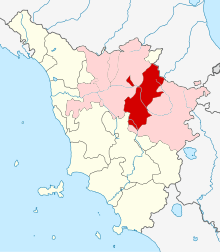Roman Catholic Diocese of Fiesole
| Diocese of Fiesole Dioecesis Fesulanus | |
|---|---|
 Fiesole Cathedral | |
| Location | |
| Country |
|
| Ecclesiastical province | Florence |
| Statistics | |
| Area | 1,300 km2 (500 sq mi) |
| Population - Total - Catholics |
(as of 2006) 140,900 138,900 (98.6%) |
| Parishes | 218 |
| Information | |
| Denomination | Catholic Church |
| Rite | Roman Rite |
| Established | 1st Century |
| Cathedral | Cattedrale di S. Romolo |
| Current leadership | |
| Pope | Francis |
| Bishop | Mario Meini |
| Emeritus Bishops | Luciano Giovannetti |
| Map | |
 | |
| Website | |
| www.diocesifiesole.it | |
The Diocese of Fiesole (Latin: Dioecesis Fesulanus) is a Roman Catholic diocese in Tuscany, central Italy, whose episcopal see is the city of Fiesole. It is a suffragan of the Metropolitan Archbishopric of Florence.[1][2]
History
According to local legend the Gospel was first preached at Fiesole by St. Romulus, a disciple of St. Peter. The fact that the ancient cathedral (now the Abbazia Fiesolana) stands outside the city is an indication that the Christian origins of Fiesole date from the period of the persecutions. The earliest mention of a bishop of Fiesole is in a letter of Pope Gelasius I (492-496). A little later, under Vigilius (537-555), a Bishop Rusticus is mentioned as papal legate at one of the councils of Constantinople. The legendary St. Alexander is said by some to belong to the time of the Lombard King Autari (end of the sixth century), but the Bollandists assign him to the reign of Lothair I (middle of the ninth century).
A prominent bishop was St. Donatus, an Irish monk, the friend and adviser of Emperors Louis the Pious and Lothair I. He was elected in 826 and is buried in Fiesole Cathedral, where his epitaph, which he dictated personally, may still be seen. He founded the abbey of San Martino di Mensola. Bishop Zanobi in 890 founded that of St. Michael at Passignano, which was afterwards given to the Vallombrosan monks. Other bishops were Atinolfo (1038), who opposed papal reform; Hildebrand of Lucca (1220), exiled by the Florentines; and St. Andrew Corsini (1352), born in 1302 of a noble Florentine family, who, after a reckless youth, became a Carmelite friar, studied at Paris, and who, as a bishop, was renowned as a peacemaker between individuals and states. He was canonized by Urban VIII.
Statistics
In the early 20th century, according to the Catholic Encyclopedia, the diocese had 254 parishes and 155,800 people. Within its limits there were 12 monasteries of men, including the famous Vallombrosa, and 24 convents for women.
Ordinaries
- Andrew Corsini, O.F.M.Carm. (died January 6, 1373)
- Fra Jacopo Altovita O.P. (1390)
- Antonio Caetani (seniore) (1409–1411 Resigned)
- ...
- Benozzo Federighi (1421–1450 Died)
- Leonardo Salutati (1450–1466 Died)
- Antonio degli Agli[3] (1467–1470 Appointed, Bishop of Volterra)
- Guglielmo Becchi, O.S.A.[4] (1470–1481 Resigned)
- Roberto Folchi (1481–1510 Resigned)
- Guglielmo de' Folchi (1510–1530 Died)
- Braccio Martelli (1530–1552 Appointed, Bishop of Lecce)
- Pietro Camaiani (1552–1566 Appointed, Bishop of Ascoli Piceno)
- Angelo Cattani da Diacceto, O.P. (1566–1570 Resigned)
- Francesco Cattani da Diacceto[5] (1570–1595 Died)
- Alessandro Marzi de' Medici (1596–1605 Appointed, Archbishop of Florence)
- Bartolomeo Lanfredini (1605–1614 Died)
- Baccio Gherardini (1615–1620 Died)
- Tommaso Ximenes (1620–1633 Died)[6]
- Lorenzo della Robbia (1634–1645 Died)
- Roberto Strozzi (1645–1670 Died)
- Filippo Soldani (1670–1674 Died)
- Filippo Neri degli Altoviti (1675–1702 Died)
- Tommaso Bonaventura della Gherardesca (1703–1703 Appointed, Archbishop of Florence)
- Orazio Maria Panciatichi (1703–1716 Died)
- Luigi Maria Strozzi (1716–1736 Died)
- Francesco Maria Ginori (1736–1775 Died)
- Ranieri Mancini (1776–1809 Resigned)
- Martino Leonardo Brandaglia (1815–1825 Died)
- Giovanni Battista Parretti (1828–1839 Appointed, Archbishop of Pisa)
- Vincenzo Menchi (1843–1846 Died)
- Francesco Bronzuoli (1848–1856 Died)
- Gioacchino Antonelli (1857–1859 Died)
- Lorenzo Frescobaldi (1871–1874 Died)
- Luigi Corsani (1874–1888 Died)
- Benedetto Tommasi (1888–1892 Appointed, Archbishop of Siena)
- David Camilli (1893–1909 Died)
- Giovanni Fossà (1909–1936 Died)
- Giovanni Giorgis (1937–1953 Appointed, Bishop of Susa)
- Antonio Bagnoli (1954–1977 Retired)
- Simone Scatizzi (1977–1981 Appointed, Bishop of Pistoia)
- Luciano Giovannetti (1981–2010 Retired)
- Mario Meini (2010–)
References
- ↑ "Diocese of Fiesole" Catholic-Hierarchy.org. David M. Cheney. Retrieved October 7, 2016
- ↑ "Diocese of Fiesole" GCatholic.org. Gabriel Chow. Retrieved October 7, 2016
- ↑ Aglio was a humanist and author of a collection of lives of the saints.
- ↑ Becchio was a preacher, and author of commentaries on Aristotle and on the Sentences of Peter Lombard.
- ↑ Cattani was a theologian at the Council of Trent and a prolific writer.
- ↑ "Bishop Tommaso Ximenes" Catholic-Hierarchy.org. David M. Cheney. Retrieved November 25, 2016
Books and articles
External links
- "Fiesole". Catholic Encyclopedia. Retrieved 2007-02-18.
- Official website (in Italian)
acknowledgment
![]() This article incorporates text from a publication now in the public domain: Herbermann, Charles, ed. (1913). "article name needed". Catholic Encyclopedia. New York: Robert Appleton.
This article incorporates text from a publication now in the public domain: Herbermann, Charles, ed. (1913). "article name needed". Catholic Encyclopedia. New York: Robert Appleton.
Coordinates: 43°48′00″N 11°18′00″E / 43.8000°N 11.3000°E